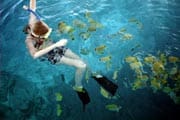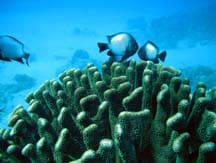“Ola na; papa i pulama ‘ia” –
Cherish the living reefs

How to Respect Hawaii’s Marine Life
Akoakoa (a coral polyp) is the very first organism born in the Kumulipo and has the ability to remain strong and steadfast in rough ocean conditions. When things get rough, we must also remain steadfast to what we know is right and defend that which is most important to our survival – our land and ocean.
Coral reefs are extremely diverse and important ecosystems. They provide protection and shelter for many species (fish, mollusks, and other invertebrates) and protect the coast from strong currents, waves, and even tsunamis!
About 25% of the roughly 150 species of corals in Hawaiian waters are endemic. The reefs formed by lobe corals and other stony species are home to over 9,000 species of invertebrates and more than 7,000 of these are endemic! These reefs are a major part of our natural and cultural heritages. Losing corals, reefs, and the organisms in them would mean losing cultural relationships that were forged by Native Hawaiian ancestors over thousands of years.
Please Do Not Feed the Fish
It disrupts their natural feeding habits and you may be injured. Coral Reef ecosystems feed, shelter and provide habitats for animals. They protect the shoreline from wave and sand erosion and create Hawai’i’s famous white sand beaches and underwater gardens. Fish have plenty of food on the living reef!
Please use Biodegradable Sunscreen

Coral Etiquette
Whether you swim, snorkel, scuba, or freedive; please help protect Hawaiian reefs.
Corals are colonies of very small animals which may take hundreds of years to form the structures visible today.
Simply touching corals to see what they feel like can cause the death of an entire colony. Oils from your skin can disturb the delicate mucous membranes which protect the animals from disease. If feeding coral is startled, it retracts for protection and in doing so is unable to feed.
Please don’t walk upon or stand on coral, as this can kill the living coral polyps that are the builders of the reef structure. Consider a flotation device (placed under chest) if you’re not the best of swimmers and never stand on coral to adjust mask. Swim well and clear of the reef and kick to keep head out without the possibility of kicking the reef, or search for a sandy or coral free shallow place to stand. Don’t touch, pickup or hold reef life, including octopus.
Using fewer household chemicals, especially on your lawn or garden, or in your kitchen or bathroom can help prevent marine pollution. Fish safe sunscreen is an important choice to make. It is also beneficial to support reef-friendly businesses, such as snorkel or dive operations that take steps to avoid damage to the reefs.
Look, but PLEASE don’t touch or feed!
A careless mistake could wipe out a whole community. Coral reefs are the essential breath for a vast and still unknown marine life. The zoothanthellae which live in the coral, provides the essential oxygen for the coral to live and proliferate. Without the algae, the reef would not grow and without the coral, a score of marine organisms would not exist. When coral reefs are foolishly destroyed by the use of chlorine bleach or other deadly chemicals for fishing practices, this kills the algae and corals. When you destroy the coral, you strangle the marine life of its breath and deprive our future children of nourishment from the sea.
